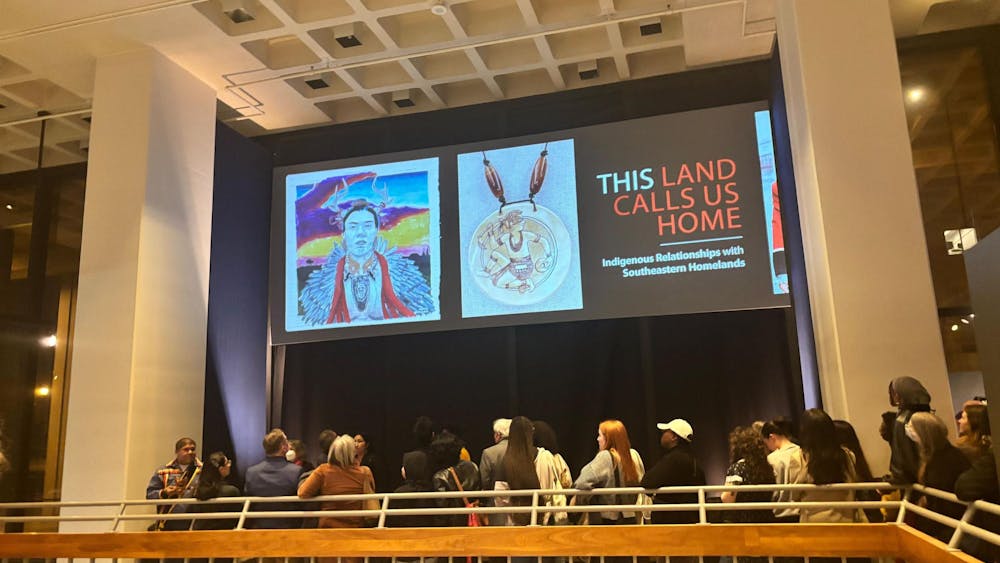During a night out with friends, Oxford College Assistant Professor of Sociology Devon Goss found herself amid a political and sociological gossip session. While ranting about TikTok trends and online discourse, the group fell head-first into a hot topic — “Is Taylor Swift really a feminist?”
After that night and additional conversations regarding the global superstar’s authenticity, intersectional feminism and potentially performative LGBTQ+ allyship, Goss decided to dive deeper and open the floor to Oxford students in the first-year discovery course, “Sociology: Taylor’s Version.”
“I thought it would be really fun to have a space in our class where we could have these conversations and talk about what sociology is able to provide in these conversations that are around these subjects that maybe our students were already thinking about,” Goss said.
Throughout the course, Goss hopes to draw tangible connections between different academic theories and the star’s long and, at times, tumultuous career. According to Goss, this is not a course on Swift as an individual — instead, the class focuses on examining music, celebrity and pop culture. Using a combination of scholarly sources and contemporary work from The New York Times and Rolling Stone, the class examines the many facets of stardom, sexuality and parasocial relationships.
But how does one even begin to discuss Swift without sinking into the depths of social media hearsay and public opinion? How does one navigate everything from her debut in 2006 to her modern megastardom while battling the various perceptions of her persona?
“Instead of just tackling Taylor Swift as this insurmountable phenomenon — because she is, obviously — looking at different elements of that is really helpful,” Goss said. “So one week we’re just talking about fandom, like, ‘What does it mean to be a fan of somebody? What kind of community does that create?’”
Much of the class deals with conceptualizing power and status among the rich and famous. Jade Feng (26Ox) chose this course to begin her sociology major. Although not a “Swiftie,” Feng wants to learn how “celebrity affects society.”
“It’s not only about Taylor Swift,” Feng said. “In South Korea, the K-pop singers also have this celebrity… I was hoping this course could use Taylor Swift as a general and separate level to help me examine the broader things.”
Izzy Irby (26Ox), another student in the course, is likewise not a self-proclaimed fan. However, she recognizes Swift’s mass appeal and the value of examining the longevity of her career, pointing to Swift’s use of “Easter eggs” and her record-breaking Eras Tour as evidence of her unique marketing approach.
“Whatever you think about Taylor Swift’s music, she’s very good at being a celebrity,” Irby said.
However, after Emory University shared information about the course on Facebook, many users took to the comment section to share their thoughts on studying Swift.
“Well I think we just learned the reason for Emory’s continued fall in the rankings,” one user wrote. Another user asked, “Is this satire or has society reached a new low?”
Many of the commenters expressed concern with the course’s applicability to professional life, whether that be establishing a foundation for future careers or just basic adulting skills. For Goss, these comments are not poor reflections of the class, but instead indicators of how society’s view on college has changed.
“I’m not surprised,” Goss said. “It just shows how what our ideas about college are, and that if there’s a time to investigate something like this it would be at college, and the fact that sometimes people don’t even see that as a space to do so, tells me about how we've moved away from from a liberal arts tradition of inquiry and investigation to more of a professional career training sort of pathway.”
Students like Feng and Irby echo Goss’ sentiments, recognizing the utility of exploring sociology through the megastar. Irby also elaborated on the nature of discovery seminar courses as classes built around niche portions of a larger topic.
“It’s a discovery seminar, so it’s supposed to be fun,” Irby said. “But also it is a really interesting thing to think about, and business wise, what are the ups and downs of a career? How would one mimic that?”
While fun and lighthearted, this course is no walk in the park. Contrary to popular belief on Facebook, students in the class are not slacking off.
“I was definitely surprised because we’d have to read, I don’t know, 80 to 100 pages a week for the first couple weeks while we were still doing the intro to the music industry in general, the sociology of the music industry,” Irby said. “Now it’s starting to calm down a little bit because we are getting into the actual Taylor Swift.”
Whether Swift is your top artist of the decade or the impetus for you changing the radio station in the car, we know “All Too Well” (2012) that Swift is powerful, influential and here to stay. Through this course, Oxford students are encouraged to look beyond the phone screen, past the preppy beats and between the lines of Swift’s solemn lyrics to define what celebrity is, how these individuals exist within our society and how to apply sociological theory to the little things.










